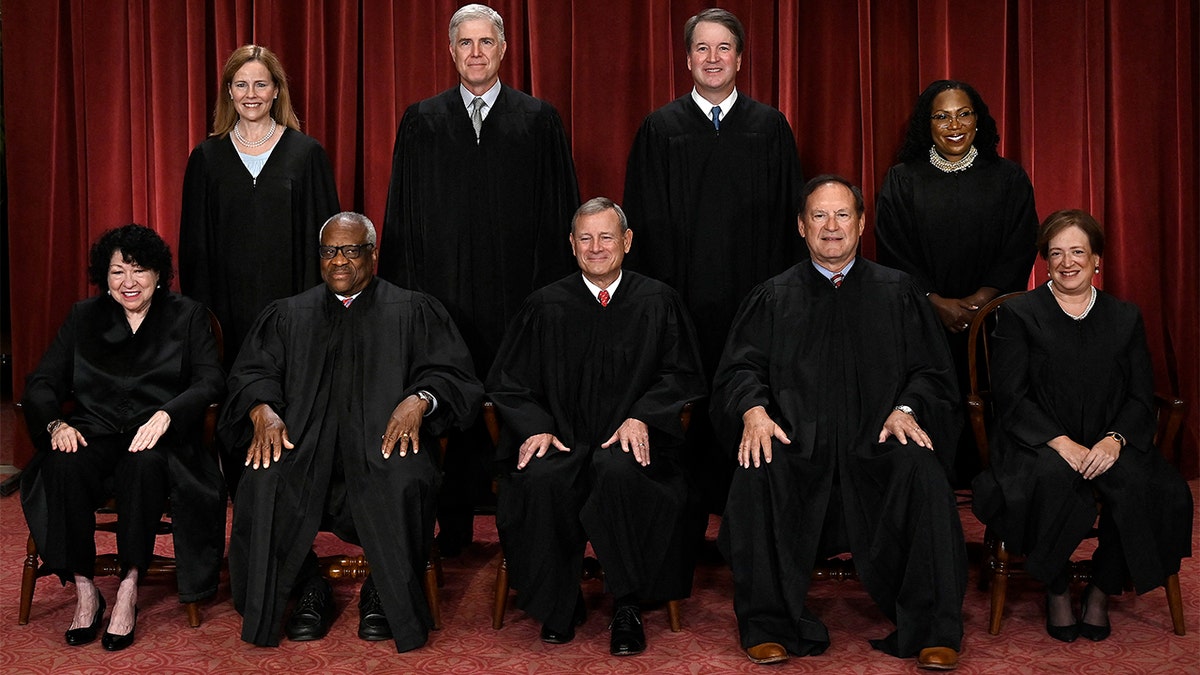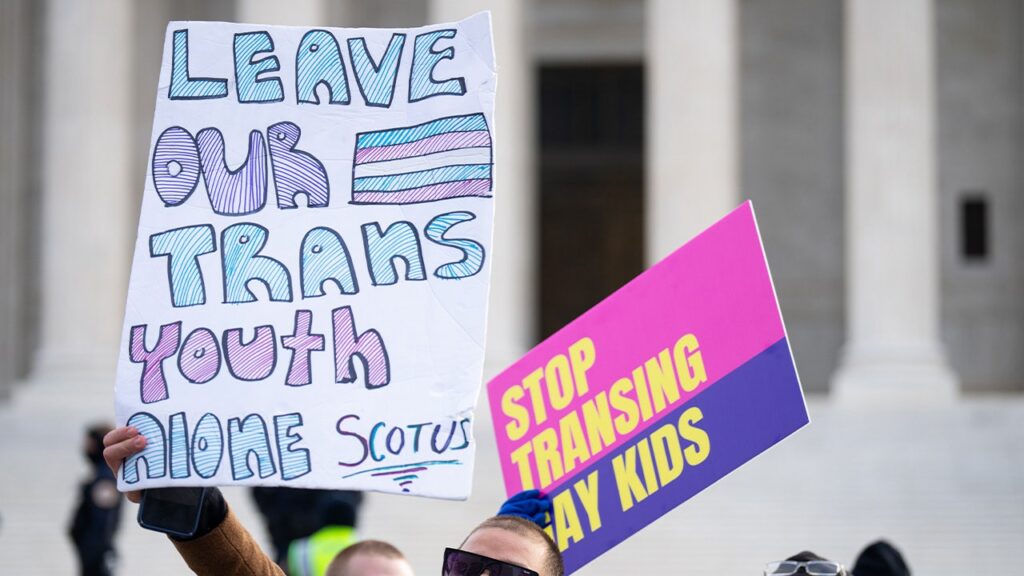NEWYou can now listen to Fox News articles!
The Supreme Court ruled Wednesday that a Tennessee law banning gender-transition treatments for adolescents in the state is not discriminatory.
At issue in the case, United States v. Skrmetti, was whether Tennessee’s Senate Bill 1, which “prohibits all medical treatments intended to allow ‘a minor to identify with, or live as, a purported identity inconsistent with the minor’s sex’ or to treat ‘purported discomfort or distress from a discordance between the minor’s sex and asserted identity,'” violates the Equal Protection Clause of the Fourteenth Amendment.
Writing for the majority, Chief Justice John Roberts said that the law in question is not subject to heightened scrutiny “because it does not classify on any bases that warrant heightened review.”
All three liberal justices notably dissented in the case.
SUPREME COURT APPEARS DIVIDED OVER STATE BANS ON GENDER TRANSITION ‘TREATMENTS’ FOR MINORS
That law in question prohibits states from allowing medical providers to deliver puberty blockers and hormones to facilitate a minor’s transition to another sex.
It also targets healthcare providers in the state who continue to provide such procedures to gender-dysphoric minors – opening these providers up to fines, lawsuits and other liability.
The court’s ruling comes after many other states have moved to ban or restrict medical treatments and procedures for transgender adolescents, drawing close attention to the case. During the oral arguments, justices on the Supreme Court appeared reluctant to overturn Senate Bill 1, with Chief Justice Roberts and Justice Brett Kavanaugh suggesting that state legislatures, rather than courts, are best equipped to regulate medical procedures.
The Constitution leaves such questions “to the people’s representatives,” Roberts said, rather than to nine justices on the Supreme Court, “none of whom is a doctor.”
SUPREME COURT WEIGHS TRANSGENDER YOUTH TREATMENTS IN LANDMARK CASE

Justice Samuel Alito cited “hotly disputed” medical studies on the alleged benefits of such medical treatments. He also referred to other research from Great Britain and Sweden that reported on the negative consequences teens experienced after undergoing gender transition treatments.
Alito told the government’s attorney that those studies “found a complete lack of high-quality evidence showing that the benefits of the treatments in question here outweigh the risks.”
“Do you dispute that?” Alito asked during oral arguments.
Justice Sonia Sotomayor, however, countered with evidence from underage individuals that were denied treatment.
“Some children suffer incredibly with gender dysphoria, don’t they? I think some attempt suicide?” she said. “The state has come in here and, in a sharp departure from how it normally addresses this issue, it has completely decided to override the views of the parents, the patients, the doctors who are grappling with these decisions and trying to make those trade-offs.”
The American Civil Liberties Union (ACLU) are the petitioners in the case, representing the parents of three transgender adolescents and a Memphis-based doctor who treats transgender patients.
The Biden administration had previously joined the petitioners in the case via a federal law that allows the administration to intervene in certain cases certified by the attorney general to be of “general public importance.”
LGBTQ+ ADVOCATES, FAMILIES SUE TRUMP ADMIN FOR ENDING FUNDING OF TRANSGENDER HEALTHCARE UNDER 19
However, the Trump administration notified the Supreme Court in February that the government would be changing its stance on the constitutionality of the law, saying the Tennessee law does not violate the equal protection clause.
Also at issue was the level of scrutiny that courts should use to evaluate the constitutionality of state bans on transgender medical treatment for minors, such as SB1, and whether these laws are considered discriminating on the basis of sex or against a “quasi-suspect class,” thus warranting a higher level of scrutiny under the Equal Protection Clause of the Constitution.
That was another focus of the oral arguments in December, as petitioners and respondents battled for more than two hours over the level of scrutiny that the court should apply in reviewing laws involving transgender care for minors, including SB1.
Tennessee argued then that its law can still withstand even the test of heightened scrutiny, contending in a court brief that it does have “compelling interests” to protect the health and safety of minors in the state and “in protecting the integrity and ethics of the medical profession.”
SUPREME COURT CAN TAKE MASSIVE STEP IN PREVENTING TRANS ATHLETES IN GIRLS’ SPORTS WITH HISTORIC HEARING
The high court’s decision comes at a time when transgender rights are a hotly contested topic.
President Donald Trump cracked down on the issue almost immediately after being sworn in to his second White House term in January.
Just weeks after his inauguration, Trump signed an executive order preventing biological men from competing in women’s sports.
The order, titled “Keeping Men Out of Women’s Sports,” was signed on National Girls and Women in Sports Day. It prohibits schools and colleges that receive federal funds and are subject to Title IX from allowing transgender-identifying biological men onto women’s sports teams and into women’s locker rooms and restrooms.
If such institutions fail to comply with the order, they could become subject to investigations and lose federal funds.
The Trump administration’s policies on transgender rights have inevitably become the targets of legal challenges launched by advocacy groups, medical organizations and individuals who claim they are discriminatory.
This is a breaking news story. Check back for updates.
Read the full article here


